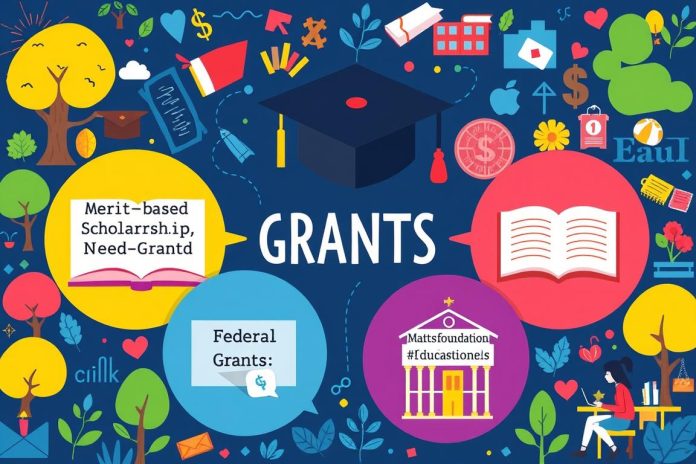Did you know over 90% of successful nonprofits focus on one main revenue source, like government or corporate support? This fact shows how crucial educational grants are in changing lives and boosting academic success. With the high cost of education, getting grants is more important than ever.
Educational grants help students get into higher education without having to pay back the money, unlike loans. These grants allow many students to chase their dreams and bring new ideas to the world. There are many types of grants available, from federal and state to private and corporate ones. They are key in helping students reach a brighter future.
Grants can make a big difference in your education and future career. They are great for those who need money for college or want to fund their research and programs. With support from governments, private foundations, corporations, and nonprofits, you have endless chances to grow educationally.
Finding a grant can be tough since there’s a lot of competition. It’s important to show your enthusiasm and knowledge in what you study. Grants often look at your school level, what you’re studying, your financial situation, and personal details. This includes your gender, if you’re part of a minority, a veteran, your age, how much you earn, and if you have any disabilities.
Key Takeaways
- Educational grants provide crucial tuition assistance without the burden of repayment.
- They open doors to higher education and promote innovation and societal contributions.
- Numerous types of grants exist, including federal, state, private, corporate, and foundation grants.
- The competition for grants can be intense, requiring demonstrable passion and knowledge in your field.
- Eligibility for grants often depends on academic level, field of study, financial need, and demographic factors.
Understanding the Basics of Educational Grants
Educational grants help many achieve their dreams without the worry of paying back. This support comes from governments, private groups, businesses, and charities.
What Are Educational Grants?
Grants are funds given to support students’ education. They are free money and don’t need to be paid back. They mainly help those in financial need but also reward achievement.
Types of Educational Grants
Grants come in different types to ensure everyone can find help. Here are the main kinds:
- Federal Grants: The biggest help comes from the federal government, especially the Pell Grant for those in need.
- State Grants: States offer grants and scholarships to their residents who go to college locally.
- Private Grants: Companies, foundations, and groups also offer scholarships or grants.
- Institutional Grants: Many colleges provide their own scholarships to students.
- Corporate Grants: Companies often sponsor education in specific areas or for certain groups.
Importance of Educational Grants
Educational grants play a key role. They make good education possible and lessen money worries. Merit-based scholarships honor academic success. Meanwhile, need-based grants help those who can’t afford schooling. Groups like the American Association of Educators offer grants for resources, showing a strong commitment to equal education and new ideas.
Knowing how educational grants work helps you find financial aid. This makes reaching your school and career goals easier.
| Grant Name | Sponsor | Financial Purpose | Application Deadline |
|---|---|---|---|
| Pell Grant | Federal Government | Need-Based Aid | FAFSA Deadline |
| Classroom Grant | American Association of Educators | Classroom Resources | Rolling Basis |
| Innovative Reading Grant | AASL | Reading Resources | February 1 |
| Summer Literacy Grant | Dollar General | Literacy Programs | January |
| NSF Discovery Research Grant | National Science Foundation | Research Funding | First Wednesday in October |
| Computers for Learning | U.S. General Services Administration | Computer Access | Eligibility Required |
| Local Community Grants | Walmart | Community Support | December 31 |
Eligibility Criteria for Educational Grants
Getting educational grants helps a lot with school costs like tuition and books. It’s important to know what makes you eligible for this financial aid. Whether it’s for scholarships or tuition help, things like your school level, major, and financial need are key. For more details on what you need to qualify, check Grants.gov.
Academic Level
Grants are available for all school levels, from college to PhD. For example, the Federal TRIO Programs offer a lot of money to college students. On the other hand, grants from the National Science Foundation are there for PhD students, mainly in science and engineering. It’s vital to look for grants that match your academic stage.
Field of Study
What you study also affects your chance to get grants. Special areas, especially in science, technology, arts, and critical jobs, have unique grants. Grants like the EIR Early-Phase Grants are for new teaching methods. Others, like the Centers of Excellence for Veteran Student Success, focus on veterans’ education. Finding grants that fit your field can really boost your chances of getting them.
Financial Need
Your financial situation is a big part of getting grants. Some grants aim to help students who don’t have much money. The Basic Needs for Postsecondary Students Program is one such grant. Also, being at a non-profit school can affect your eligibility for certain grants. Looking into your options and their financial requirements is crucial.
Every grant has its own needs. Knowing what they are can make applying easier. For a deep dive into grant criteria, visit Grants.gov. There you’ll find a full list of grants and what you need to get them.

